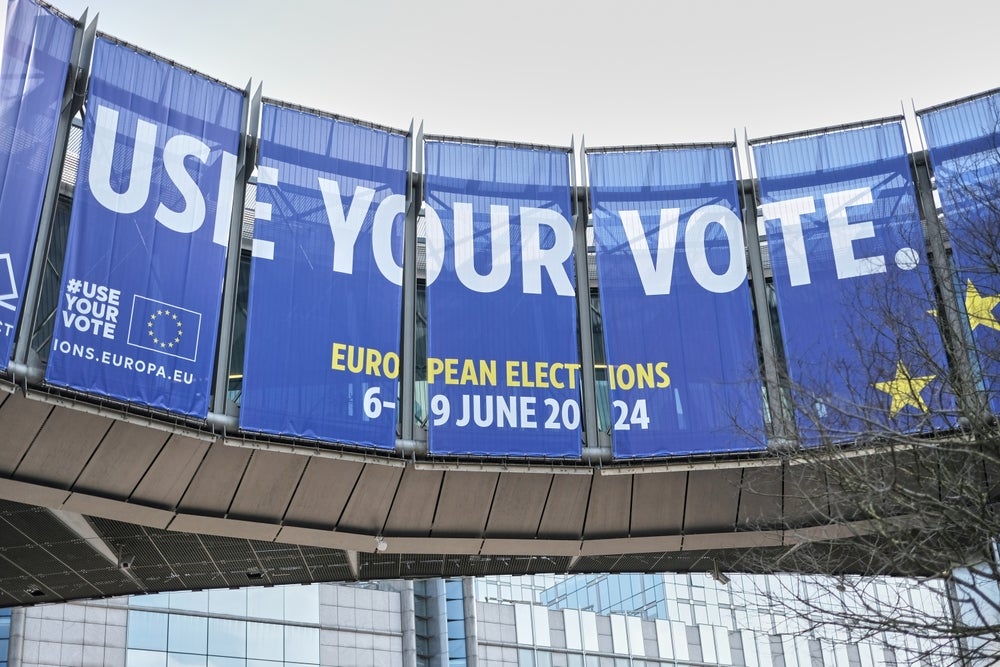Global fashion brands and suppliers will be watching closely to see who is voted into the EU Parliament on 6-9 June and how the political beliefs of the majority might affect the EU’s recent approval of Environmental and Social Governance (ESG) legislation as well as its position on global trade.
The EU is undoubtedly a major financial player within the global fashion industry. It imported €191.4bn ($207.63bn) of apparel in 2022, according to the Centre for the Promotion of Imports from developing countries (CBI) with suppliers from developing countries contributing to almost half (49.5%) of all clothing imported into the EU in terms of value.
Meanwhile, GlobalData predicts that by 2027, the EU’s own apparel market will achieve a CAGR of 3.6%, reaching EUR576.3bn ($625.16bn).
Risk of an extreme right majority for apparel
Dirk Vantyghem, the director general of Euratex, which describes itself as the voice of the European apparel and textile industry told Just Style during a recent interview there are fears an extreme right could gain ground in the next parliament.
International Apparel Federation secretary general Matthijs Crietee agrees, adding that right wing and radical right parties are expected to do well in both the European Parliament elections and upcoming national elections.
Global media reports are also following this rhetoric with The New York Times claiming these elections could leave “far right parties with more power than ever before”.
Access the most comprehensive Company Profiles
on the market, powered by GlobalData. Save hours of research. Gain competitive edge.

Company Profile – free
sample
Your download email will arrive shortly
We are confident about the
unique
quality of our Company Profiles. However, we want you to make the most
beneficial
decision for your business, so we offer a free sample that you can download by
submitting the below form
By GlobalData
Vantyghem noted the extreme right by definition tend not to be Euro-friendly so the risk of a parliament made up of predominantly those views is that it could slow down European-level decision-making.
Crietee suggests uncertainty and weak enforcement could hinder investments. On the other hand, he continued: “Companies don’t only make changes because of legislation. Once they are convinced that in the long run, society and their customer base are changing, they will press on regardless of wavering legislators.”
Impact of EU elections on apparel ESG legislation
Vantyghem acknowledged that long before talk turned to the EU elections there was anxiety from apparel suppliers based outside of Europe on how to comply with all the pieces of upcoming ESG legislation.
The most recent of these being the “right-to-repair” directive, which aims to make repair a more “attractive” economic activity for the EU, consumers and the environment. And before that the EU council approved its ecodesign regulation, which sets requirements for sustainable products from the design phase.
It is arguably, however, the EU’s already approved Corporate Sustainability Due Diligence Directive (CSDDD) that will have the biggest impact on global fashion brands, retailers and suppliers as it will require increased scrutiny on buying practices to ensure greater responsibility.
Fair Wear Foundation’s executive director Alexander Kohnstamm told Just Style these “crucial directives that have been agreed upon should not be affected by the outcome of the elections”.
But Vantyghem admitted we are still living in the unknown on the finer details for the legislation so on that basis it will be the new parliament ironing everything out that has already been agreed.
Impact of EU elections on global apparel trade, social and environmental rights
It is expected the next European mandate will put more focus on competitiveness and industrial resilience in the form of an Industrial Deal to rebalance and complement the recent Green Deal with Vantyghem telling Just Style previously: “We hope that will translate when the new commission sets its priorities so there will be a stronger focus on the industry.”
Euratex acknowledged there had been a lot and “maybe too much” legislation so it would make sense for the next five years to focus on ensuring its proper implementation and compliance.
Crietee cannot see the European Green Deal being revoked, but he predicts there could be “less enthusiasm for translating European laws into national legislation and, importantly, less enthusiasm to enforce existing laws”.
He warned the uncertainty that a different political wind may create around the green deal laws is “potentially harmful for industry”.
Vantyghem remains optimistic and believes “it’s about how can we implement it all [ESG legislation] in combination with a vision of a strong industry to ensure the European industry has its place and can remain competitive.”
For Crietee, however there also remains some question marks around the debate on tariffs for countries exporting garments to the EU.
“We count on Parliament to ensure an impactful connection between trading conditions and the human rights and environmental track record,” he noted.
Vantyghem asserted that we do need to keep global supply chains open and explained that despite it being his role to represent European interests, he won’t be calling for a Europe-first approach.
He knows the apparel sector is interdependent on global supply chains and needs them to continue.
He concluded: “It’s a delicate balance and perspective to say everyone should be playing by the rules and yes we should interfere in a hard way for those that don’t comply with the rules but we do need to keep supply chains open, especially given that 70-80% of what Europe wears comes from outside.”


